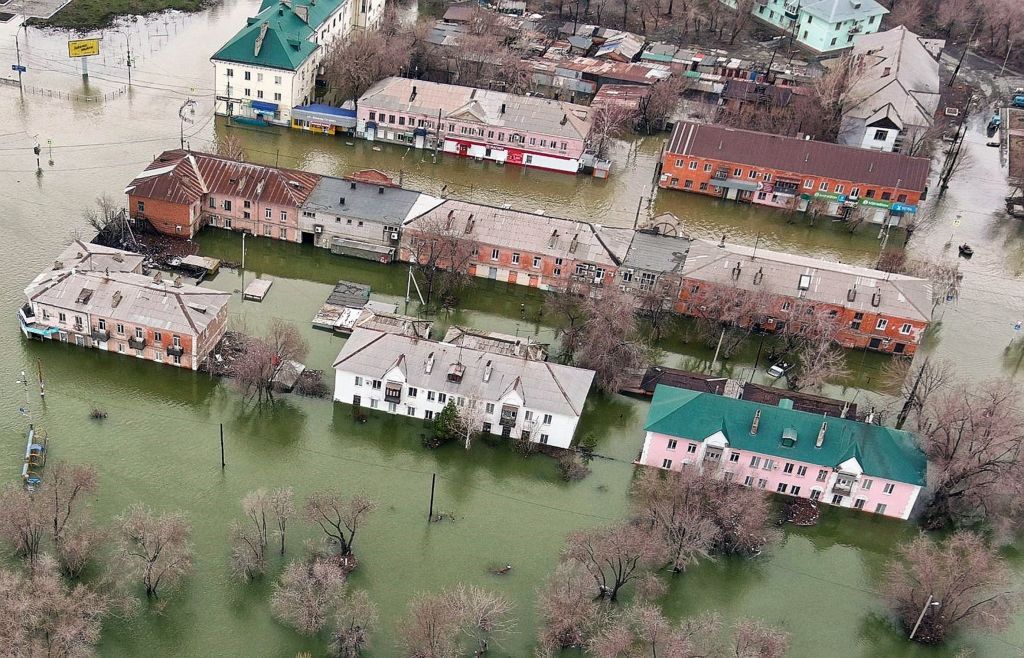Flooding continues to wreak havoc in Russia’s Orenburg and Kurgan oblasts, located near the border with Kazakhstan. The Ural River has swelled due to melting snow and heavy rainfall, leading to the collapse of a dam in the city of Orsk on April 5. The floodwaters have resulted in the evacuation of over 120,000 people in the affected regions, including parts of northern Kazakhstan. In the city of Orenburg, at least 3,000 homes have been flooded, prompting authorities to call for the mass evacuation of residents. The water levels in the Ural River have risen to dangerously high levels, with emergency workers on high alert.
In a separate incident in Russia’s Smolensk region, a tragic bridge collapse in Vyazma on April 8 claimed the life of a woman and left five others injured, including a child. Emergency services responded to the scene to assist those affected by the collapse. The incident highlights the impact of deteriorating infrastructure and the need for preventative measures to ensure the safety of residents. The collapse serves as a reminder of the potential dangers posed by aging structures and the importance of regular inspections and maintenance to prevent such tragedies.
The flooding in Orenburg and Kurgan oblasts has also had economic repercussions, with the Orsk oil refinery halting its operations due to the rising waters. The suspension of operations at the refinery underscores the broader impact of natural disasters on industries and the local economy. As authorities work to address the immediate humanitarian crisis caused by the flooding, they must also consider the long-term implications for the region’s infrastructure and economy. Efforts to rebuild and strengthen infrastructure will be crucial in mitigating the impact of future disasters on the region.
The ongoing flooding in Russia’s border regions highlights the interconnectedness of environmental challenges and the need for coordinated responses to mitigate their effects. The involvement of multiple regions and countries in responding to the floodwaters underscores the importance of international cooperation in addressing natural disasters. Collaborative efforts in disaster relief, infrastructure development, and resource management are essential in building resilience against future crises. As climate change continues to exacerbate extreme weather events, the importance of proactive measures to adapt to and mitigate the impacts of such events cannot be overstated.
In the face of these challenges, independent journalism plays a crucial role in providing timely and accurate information to the public. By supporting independent media outlets in Ukraine and beyond, individuals can contribute to the dissemination of information that is essential for understanding and responding to events such as the ongoing flooding in Russia. Independent journalists play a vital role in holding authorities accountable and ensuring transparency in reporting on crises, making their work an invaluable resource for communities facing disaster. By supporting independent journalism, individuals can help empower communities to advocate for their needs and drive positive change in response to natural disasters and other critical events.
As the flooding crisis in Orenburg and Kurgan oblasts continues to unfold, it is essential for individuals to stand in solidarity with those affected and support efforts to provide assistance and relief. By raising awareness, mobilizing resources, and advocating for vulnerable communities, individuals can make a meaningful impact in addressing the immediate and long-term needs of those impacted by natural disasters. In times of crisis, unity and compassion are essential in navigating the challenges posed by such events and building a resilient and supportive community for all. Joining the fight to support independent journalism and aid those affected by the flooding is a proactive step towards creating a more informed, responsive, and compassionate society.


